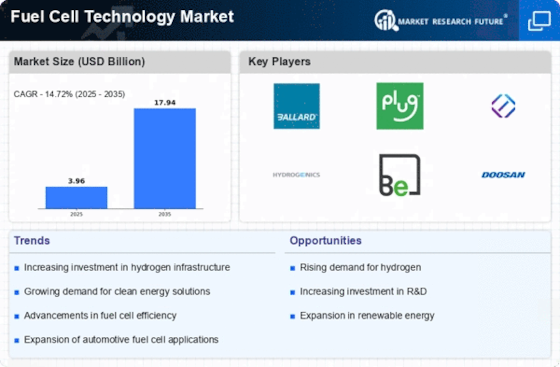Top Industry Leaders in the Fuel Cell Technology Market

*Disclaimer: List of key companies in no particular order
Exploring the Competitive Realm of Fuel Cell Technology: An In-Depth Exploration
The fuel cell technology domain, simmering with anticipation over the decades, now stands at the cusp of a profound transformation. Fueled by the triumvirate of climate apprehensions, imperatives for energy security, and the march of technological strides, it is swiftly shifting from a niche pursuit to a pervasive force in the energy landscape. This burgeoning expanse pulsates with a kaleidoscope of participants, each vying for their slice of the proverbial pie. Deciphering their stratagems, dissecting the dynamics of market ownership, and unraveling nascent trends become imperative to traverse this ebullient terrain.
Noteworthy Actors and their Tactics:
Fuel Cell Energy, Hydrogenics, Plug Power, Ballard Power Systems, Panasonic Corporation, Toshiba Corporation, Doosan Corporation, SFC energy, Plug Power, AFC energy, and others populate this vibrant stage.
-
Seasoned Original Equipment Manufacturers (OEMs): Stalwarts such as Toyota, Hyundai, and Honda capitalize on their well-established prowess in the automotive realm to propel fuel cell vehicles (FCVs) into the limelight. Toyota spearheads the contingent with its Mirai model, while Hyundai's Nexo and Honda's Clarity Fuel Cell steadily gain ground. Their blueprint revolves around large-scale production and cost amelioration, striving to position FCVs as competitive counterparts to battery-electric vehicles (BEVs).
-
Purveyors of Technological Advancement: Enterprises like Bloom Energy, FuelCell Energy, and SolidEnergy Systems pivot towards stationary applications for fuel cells, tailored for both residential and commercial edifices. Their product suites cater to sectors in search of unblemished and dependable auxiliary power or off-grid solutions. Their competitive edge emanates from proprietary membrane and electrode technologies, propelling efficiency and performance.
-
Hydrogen Infrastructure Visionaries: Air Liquide, Linde, and Hyzon Motors pour substantial investments into hydrogen production, storage, and transportation infrastructure. Their objective: resolving the conundrum of simultaneous development of refueling networks and vehicle deployment to nurture market assimilation.
Analysis of Market Ownership:
-
Geographic Landscape: Presently, the Asia Pacific region occupies the zenith, propelled by governmental incentives and ambitious hydrogen initiatives in China, Japan, and South Korea. Europe trails closely, spurred by stringent emission regulations and escalating aspirations for carbon neutrality. Despite North America's initial mover advantage, it grapples with intensified competition from BEVs and lags in hydrogen infrastructure.
-
Application Sphere: Currently, the transportation sector reigns supreme, with FCVs anticipated to garner substantial traction in the realm of heavy-duty trucking and buses. However, stationary applications foresee the swiftest surge, fueled by the exigency for pristine and resilient power sources in microgrids and secluded locations.
Unfolding Trends and Game-Changers:
-
Solid-State Fuel Cells: The advent of this next-gen technology promises fuel cells that are lighter, more compact, and boast faster recharging capabilities. Pioneered by startups like Ceramic Fuel Cells and Pajarito Powders, they pose a challenge to the traditional dominance of Proton Exchange Membrane (PEM) technology.
-
Green Hydrogen Production: The ascension of electrolyzers, energized by renewable sources, propels hydrogen into the realm of genuinely clean fuel. Front-runners like Siemens Energy and Nel Hydrogen lead the charge, unlocking the potential for fuel cell deployments with zero emissions.
-
Fuel Cell-Battery Hybrids: Merging the expeditious refueling of fuel cells with the formidable energy density of batteries presents an optimal amalgamation for extensive range and flexibility. Trailblazers like Ballard Power Systems and Dana pioneer this auspicious approach.
The Holistic Competitive Scenario:
The fuel cell technology landscape is marked by fierce competition, swift innovation, and a dynamic interplay between established entities and insurgent contenders. Collaboration and partnerships emerge as pivotal for triumph, with participants forging alliances spanning the entire value chain – from technological innovators and OEMs to infrastructure providers and energy enterprises. While challenges of cost reduction and infrastructure expansion persist, the mounting emphasis on green hydrogen production and the diverse array of application domains paints a sanguine picture for fuel cell technology's future.
The victors will be those adept at adeptly navigating the dynamically competitive landscape, embracing innovation, and constructing robust collaborations across the ecosystem. The race is afoot, and the fuel cell technology domain is destined to witness riveting developments in the years ahead.
Industry Progress and Recent Chronicles:
Fuel Cell Energy (FCE):
- Dec 15, 2023: Unveils a $48.4 million contract with the California Energy Commission for the deployment of fuel cell microgrids at critical facilities.
- Nov 30, 2023: Allies with POSCO Energy to develop and implement fuel cell microgrids in South Korea.
Hydrogenics (HYDG):
- Dec 19, 2023: Secures a €14 million order from Ballard Power Systems for hydrogen fuel cell modules for heavy-duty trucks.
- Nov 16, 2023: Announces a collaboration with Shell to conceive and institute hydrogen refueling stations in Europe.
Plug Power (PLUG):
- Dec 20, 2023: Partners with Walmart to introduce 12,000 hydrogen fuel cell forklifts in its distribution centers.
- Nov 29, 2023: Declares a $1.5 billion green bond offering to finance the expansion of hydrogen infrastructure.
Ballard Power Systems (BLDP):
- Dec 19, 2023: Secures a €14 million order from Hydrogenics for hydrogen fuel cell modules for heavy-duty trucks.
- Nov 22, 2023: Collaborates with Ørsted to elaborate and execute a 50 MW green hydrogen production facility in Denmark.










